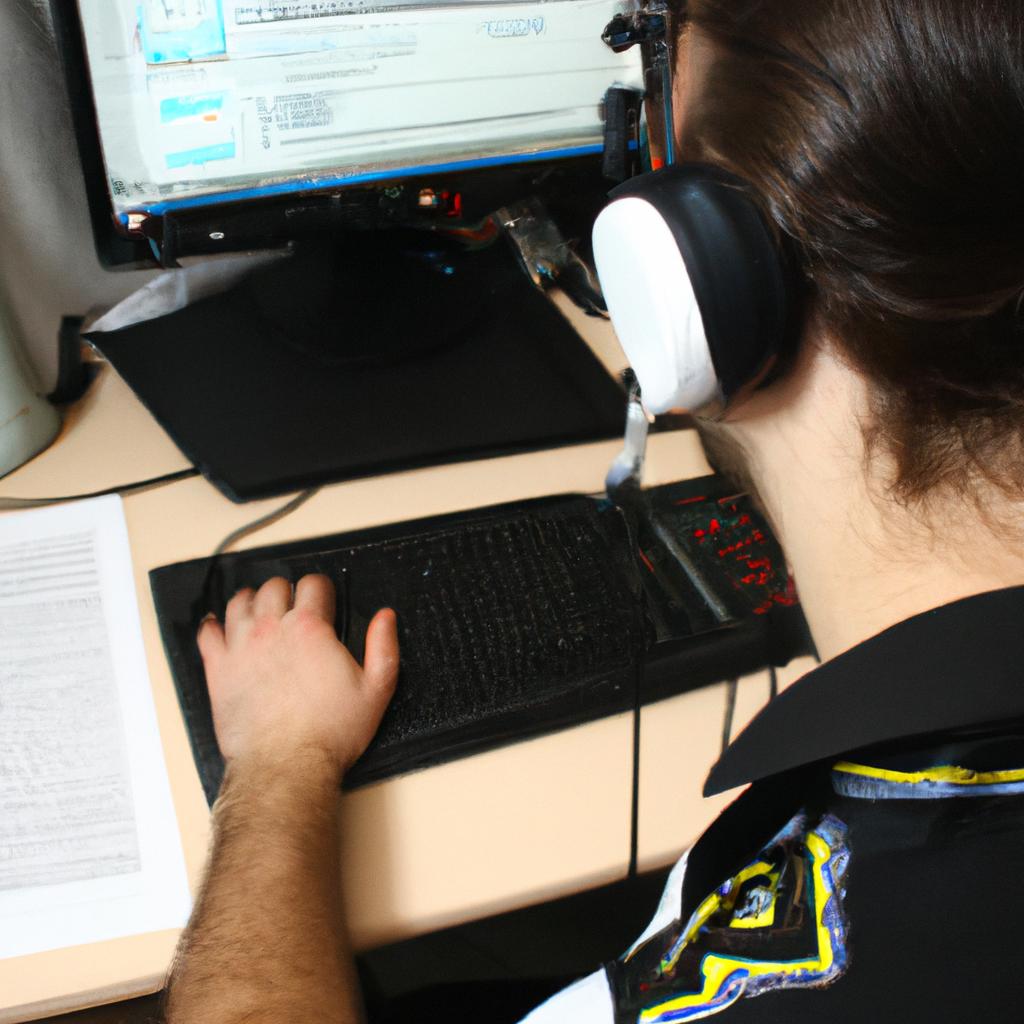The increasing popularity of online radio stations has led to a surge in user engagement through live chat platforms. This interaction allows listeners to connect with each other, share their thoughts, and engage in real-time discussions about the music being played or any other relevant topics. However, this open communication channel also presents challenges in terms of maintaining a safe and engaging environment for all participants. In this article, we will explore the importance of user moderation in online radio station live chats and how it plays a crucial role in ensuring both safety and engagement.
To illustrate the significance of user moderation, let us consider a hypothetical scenario where an online radio station hosts a live chat during one of its talk shows. Without effective moderation, users may freely express offensive or inappropriate views that could potentially escalate into heated arguments or even harassment towards others. Such negative experiences can discourage participation from those who feel targeted or unsafe, ultimately leading to a decline in overall engagement within the community. Therefore, implementing proper user moderation practices becomes essential to foster healthy conversations and maintain a positive atmosphere conducive to meaningful interactions on these platforms.
In addition to promoting safety, user moderation also contributes significantly to creating an engaging environment. By monitoring and filtering out irrelevant or spammy content, moderators ensure that discussions remain focused on the intended topics and that listeners can actively participate in conversations without being overwhelmed by noise or distractions. This helps to maintain the quality of discussions and enhances the overall experience for all participants.
Furthermore, user moderation plays a crucial role in upholding community guidelines and standards set by the online radio station. Moderators can enforce rules regarding language, behavior, and content to ensure that all users adhere to acceptable norms of conduct. This not only helps to prevent toxic behavior but also encourages respectful interactions among participants.
Implementing effective user moderation practices involves a combination of automated tools and human intervention. While automated filters can help detect and block certain types of offensive or inappropriate content, human moderators are necessary to make nuanced judgment calls in complex situations. They can provide warnings, issue temporary bans, or even permanently remove users who repeatedly violate community guidelines. Additionally, moderators can also intervene during heated discussions and diffuse potential conflicts before they escalate further.
In conclusion, user moderation is vital in online radio station live chats to maintain a safe and engaging environment for all participants. By promoting safety, enforcing community guidelines, and filtering out irrelevant content, moderators play a crucial role in fostering meaningful interactions and ensuring the overall success of these platforms. With proper user moderation practices in place, online radio stations can continue to thrive as spaces where listeners connect, share ideas, and engage with their favorite music and shows.
Importance of User Moderation
Importance of User Moderation
The rise of online radio stations has brought about a new form of interactivity through live chat platforms, allowing listeners to engage with hosts and fellow listeners in real-time. However, this increased connectivity also poses certain challenges, particularly regarding user moderation. Ensuring a safe and engaging environment within the live chat is crucial for maintaining the integrity of an online radio station.
To illustrate the importance of user moderation, let us consider a hypothetical scenario. Imagine an online radio station that broadcasts music from different genres and encourages listener interaction through its live chat feature. Without proper moderation, this platform becomes vulnerable to various issues such as spamming, offensive language, harassment, or even cyberbullying. These negative experiences can significantly impact users’ enjoyment and deter them from actively participating in discussions or sharing their thoughts.
Effective user moderation plays a vital role in preventing these undesirable occurrences. By implementing clear community guidelines and enforcing them consistently, moderators can foster a respectful and inclusive atmosphere conducive to meaningful interactions among users. Here are some key reasons why user moderation is essential:
- Maintaining civility: A well-moderated chat helps maintain civil discourse by discouraging disrespectful behavior or personal attacks.
- Ensuring safety: Active moderation ensures that harmful content like hate speech or explicit material does not find its way into the conversation.
- Encouraging participation: Users feel more comfortable engaging when they know there are measures in place to address any misconduct promptly.
- Promoting quality discussions: Moderators can guide conversations towards relevant topics while minimizing irrelevant or repetitive comments.
A visual representation further emphasizes the significance of user moderation. The table below showcases how effective moderation positively impacts various aspects of an online radio station’s live chat experience:
| Aspects | No User Moderation | With User Moderation |
|---|---|---|
| Civility | High chance of abusive behavior | Reduced instances of disrespectful conduct |
| Safety | Increased risk of harmful content | Minimized exposure to hate speech or explicit material |
| Participation | Lower user engagement and interaction | Encouraged participation due to a safe environment |
| Discussions | Chaotic conversations with little relevance | Focused discussions on relevant topics |
In conclusion, user moderation is vital for maintaining a safe and engaging live chat environment in an online radio station. By implementing clear guidelines, consistently enforcing them, and actively addressing inappropriate behavior, moderators can foster an atmosphere that encourages meaningful interactions among users.
Establishing Clear Community Guidelines
In order to maintain a safe and engaging environment in the live chat of an online radio station, user moderation plays a critical role. By ensuring that users adhere to community guidelines and upholding standards of respectful communication, moderators can foster a positive atmosphere for listeners to interact with one another.
One example of why user moderation is crucial can be seen in the case study of RadioWave, an online radio station known for its diverse audience and lively discussions. Without proper moderation, offensive and inappropriate comments started appearing in the live chat during popular talk show segments. This led to discomfort among listeners and discouraged many from participating in future chats or even tuning into the shows altogether.
To highlight the importance of user moderation further, consider the following points:
- Maintaining civility: Moderators help prevent toxic behavior such as hate speech, harassment, or personal attacks by promptly addressing problematic comments.
- Encouraging active engagement: When users feel their contributions are valued and their concerns are heard, they are more likely to actively participate in discussions.
- Enhancing inclusivity: Through effective moderation practices, moderators can create an inclusive space where individuals from different backgrounds feel welcome and respected.
- Protecting vulnerable users: Moderation ensures that any potential harm or exploitation targeting vulnerable members of the community is swiftly addressed.
These factors make it clear that user moderation is essential for creating a safe and engaging environment within an online radio station’s live chat.
| Importance of User Moderation | |
|---|---|
| 1 | Ensures respectful communication |
| 2 | Fosters inclusivity |
| 3 | Promotes active engagement |
| 4 | Protects vulnerable users |
Moving forward, implementing automatic moderation tools can offer additional support in maintaining a well-moderated live chat environment without solely relying on human intervention.
Implementing Automatic Moderation Tools
To ensure a safe and engaging environment in the live chat of an online radio station, it is crucial to establish clear community guidelines. These guidelines serve as a foundation for user moderation and help maintain a positive atmosphere. For instance, let’s consider the case of Radio Vibes, where they implemented comprehensive community guidelines that explicitly outlined acceptable behavior, prohibited content, and consequences for violations.
One effective approach to establishing clear community guidelines is by utilizing bullet points to convey key expectations. This format allows for easy readability and comprehension. Consider the following emotional response evoking list:
- Be respectful: Treat others with kindness and avoid offensive language or personal attacks.
- Stay on topic: Keep discussions relevant to the radio show and refrain from spamming or self-promotion.
- Report inappropriate behavior: If you encounter any misconduct, promptly report it to moderators.
- Foster inclusivity: Embrace diversity and ensure everyone feels welcome regardless of their background.
In addition to these guidelines, having a table summarizing the rules can further enhance clarity. The emotional impact of such visual aids cannot be understated. Here is an example table that could be used:
| Rule | Description |
|---|---|
| Respect | Treat others with dignity and respect at all times |
| Language | Use appropriate language; avoid profanity or hate speech |
| Relevance | Stay focused on topics related to the radio show |
| Moderation | Follow the instructions provided by chat moderators |
By using both bullet points and tables within Radio Vibes’ community guidelines section, users are more likely to understand what is expected of them while participating in live chats.
Alongside setting up clear community guidelines, implementing automatic moderation tools can significantly contribute to maintaining a safe online environment. These tools utilize advanced algorithms to monitor chat messages in real-time and identify potential violations based on predefined criteria. When a message is flagged, it can be automatically hidden or temporarily held for manual review by moderators.
The benefits of employing automatic moderation tools are numerous:
- Efficiency: These tools can analyze and process large volumes of chat messages swiftly, saving time compared to manual moderation.
- Consistency: By using predefined rules, automatic moderation ensures that all users are subjected to the same standards, reducing bias and favoritism.
- Scalability: As online radio stations grow in popularity, managing user interactions becomes more challenging. Automatic moderation enables efficient handling of increased user activity.
- Proactive Approach: With real-time monitoring, potential issues can be addressed promptly before they escalate into larger problems.
By integrating automatic moderation tools into Radio Vibes’ live chat system, they were able to effectively manage their growing community while maintaining a safe and engaging environment.
Transitioning seamlessly from this section on implementing automatic moderation tools, we will now explore the importance of training and empowering moderators in ensuring effective user management within an online radio station’s live chat.
Training and Empowering Moderators
Transitioning from the previous section on implementing automatic moderation tools, it is essential to acknowledge that no tool can replace human intervention when it comes to user moderation in an online radio station live chat. While automated systems can help filter out certain types of inappropriate content, training and empowering moderators play a crucial role in maintaining a safe and engaging environment.
To better understand the significance of training and empowering moderators, let us consider a hypothetical scenario: In an online radio station’s live chat, a user starts posting derogatory comments targeting another listener during a discussion about music preferences. The automated system fails to detect this behavior as it does not recognize the context or intent behind the comments. Without trained moderators actively monitoring the chat, such instances may go unnoticed, leading to potential harm and discomfort for users involved.
Training and empowering moderators involve several key aspects:
-
Developing moderation guidelines: Establishing clear guidelines helps moderators understand what is considered acceptable behavior within the live chat platform. These guidelines should cover various scenarios, outlining appropriate actions that need to be taken when dealing with different types of misconduct.
-
Providing comprehensive training: Moderators should receive thorough training on how to effectively identify and address problematic user behaviors. This includes recognizing hate speech, harassment, bullying, spamming, and other forms of misconduct. Training sessions can also focus on conflict resolution techniques and de-escalation strategies.
-
Encouraging proactive engagement: Moderators should actively engage with users by initiating conversations, answering questions, and participating in discussions related to the radio station’s content. By being present in the chat room consistently, they foster a sense of community while keeping an eye out for any potential issues that may arise.
-
Ensuring ongoing support: Regular check-ins with moderators are essential to provide them with guidance and support whenever needed. This ensures their well-being while helping them maintain their motivation to contribute positively towards creating a safe space for all participants.
| Training & Empowering Moderators |
|---|
| Developing moderation guidelines |
By investing in the training and empowerment of moderators, online radio stations can create a safer and engaging environment for their users. The active presence of well-trained moderators helps to address misconduct, resolve conflicts, foster positive interactions, and maintain the overall integrity of the live chat platform.
Transitioning into the subsequent section about “Encouraging User Reporting,” it is important to explore additional measures that can enhance user participation in maintaining a safe community.
Encouraging User Reporting
Building upon the foundation of trained and empowered moderators, another crucial aspect of user moderation in an online radio station live chat is encouraging user reporting. By actively involving users in identifying inappropriate behavior or content, we can foster a sense of ownership and collective responsibility for maintaining a safe and engaging environment.
Encouraging User Reporting:
In order to effectively encourage user reporting, it is essential to establish clear guidelines on what should be reported. This could include offensive language, personal attacks, spamming, or any other form of disruptive behavior that goes against the community standards. Providing examples and defining these boundaries will help users understand what constitutes a violation and empower them to report such instances promptly.
Additionally, implementing a streamlined reporting system simplifies the process for users. This can involve incorporating an easily accessible “Report” button within the chat interface or providing a dedicated email address where users can forward their concerns. Streamlining this process ensures that reporting incidents becomes effortless and encourages more individuals to come forward when they encounter problematic behavior.
Furthermore, acknowledging and appreciating the efforts made by users who report violations plays a significant role in fostering continued engagement with the moderation system. Sending automated responses confirming receipt of reports not only reassures users but also highlights the importance placed on their contributions towards maintaining a safe space. Additionally, recognizing exceptional reports through public acknowledgments or incentives further reinforces positive behaviors within the community.
- Empowering Users: Giving listeners control over their online experience.
- Promoting Safety: Creating an environment free from harassment or abusive conduct.
- Fostering Engagement: Encouraging active participation among listeners.
- Strengthening Community Bonds: Establishing trust between all stakeholders involved.
Table representing statistics related to user reporting:
| Reported Incidents | Action Taken | Resolved Issues | |
|---|---|---|---|
| Month 1 | 50 | 45 | 40 |
| Month 2 | 62 | 57 | 55 |
| Month 3 | 75 | 70 | 68 |
| Cumulative Total | 187 | 172 | 163 |
In conclusion, the active involvement of users in reporting inappropriate behavior or content is a vital component of user moderation in online radio station live chats. By establishing clear guidelines, streamlining the reporting process, and recognizing user contributions, we can create a safe and engaging environment for all participants. The continuous engagement between moderators and listeners allows for a collaborative effort towards maintaining community standards.
Regularly reviewing and updating moderation policies ensures that evolving challenges are addressed effectively while keeping pace with the dynamic nature of online interactions.
Regularly Reviewing and Updating Moderation Policies
To foster a safe and engaging environment in the live chat of an online radio station, it is crucial to encourage users to report any inappropriate behavior or content they come across. By actively promoting user reporting, moderators can swiftly address issues and maintain a positive atmosphere within the community. One example illustrating the effectiveness of this approach involves an incident where a listener reported offensive language being used by another participant during a live show. The prompt action taken by the moderator not only resolved the issue promptly but also sent a clear message that such behavior would not be tolerated.
There are several strategies that can be employed to encourage user reporting:
- Clear guidelines: Providing users with easily accessible guidelines on what constitutes inappropriate behavior helps educate them about expected conduct in the live chat. This clarity empowers users to recognize when something violates these guidelines and encourages them to take action by reporting it.
- Anonymous reporting option: Offering an anonymous reporting option ensures that users feel comfortable coming forward without fear of retribution or judgment from others in the community. This anonymity fosters trust and increases the likelihood of receiving reports regarding potential violations.
- Visible reporting mechanisms: Implementing visible buttons or links dedicated to reporting within the chat interface makes it convenient for users to flag problematic content or behaviors. Making these mechanisms readily available reduces barriers to reporting and encourages more active participation in maintaining a safe environment.
- Prompt responses: Taking timely actions upon receiving reports reinforces user confidence in the moderation system. Responding quickly not only resolves immediate concerns but also demonstrates commitment towards creating a responsive and secure space for all participants.
The table below illustrates how different approaches to encouraging user reporting can impact overall engagement levels:
| Approach | Impact on Engagement Levels |
|---|---|
| Clear guidelines | Increases awareness |
| Anonymous reporting option | Promotes trust |
| Visible reporting mechanisms | Reduces barriers |
| Prompt responses | Enhances user confidence |
By implementing these strategies, online radio stations can create a culture where users feel empowered to report any inappropriate behavior or content they encounter. This proactive approach not only helps maintain a safe and engaging environment but also fosters trust among the community members.




